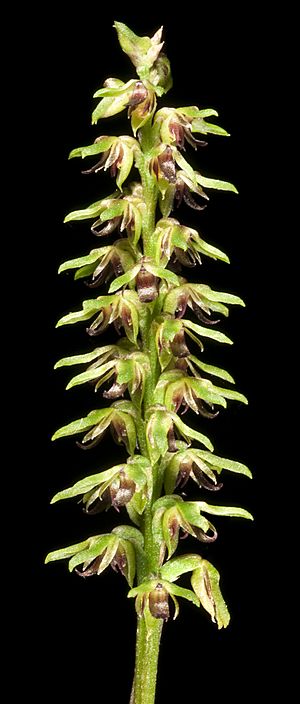Mallee midge orchid facts for kids
Quick facts for kids Mallee midge orchid |
|
|---|---|
 |
|
| Scientific classification | |
| Genus: |
Genoplesium
|
| Species: |
nigricans
|
| Synonyms | |
|
|
The mallee midge orchid (scientific name: Genoplesium nigricans) is a special type of orchid. It grows only in Australia. This plant is a small herb that grows on the ground. It has one long leaf that wraps around its stem. It can have up to 50 tiny flowers. These flowers are usually greenish with a dark red or maroon 'lip' (called a labellum). They often smell like fruit! Sometimes, people get this orchid confused with another one called Corunastylis nigricans. That one has purplish-brown flowers and only grows in certain parts of South Australia.
Contents
What Does the Mallee Midge Orchid Look Like?
The mallee midge orchid is a small plant that grows from the ground. It lives for many years and loses its leaves in some seasons. A single long leaf grows from the base of the plant. This leaf wraps around the stem up to where the lowest flowers are. The leaf can be about 80 to 250 mm (3 to 10 inches) long and 1 to 2 mm (0.04 to 0.08 inches) wide.
Flowers of the Mallee Midge Orchid
The plant produces a spike with 5 to 50 tiny flowers. These flowers are crowded together and hang downwards. They are bright green with a dark maroon or purplish-black 'lip' (labellum). Each flower is about 3 mm (0.1 inches) wide and long. The petals and sepals (parts that look like petals) do not spread out much.
The top sepal is broad and egg-shaped, about 2 mm (0.08 inches) long and wide. The two side sepals are lance-shaped. They are about 2.5 to 3.5 mm (0.10 to 0.14 inches) long and 1 mm (0.04 inches) wide. The petals are egg-shaped, about 2 mm (0.08 inches) long and less than 1 mm (0.04 inches) wide.
The dark labellum is egg-shaped and has slightly wavy edges. A special part called the 'callus' is narrow and extends almost to the tip of the labellum. The 'column' (a central part of the flower) has rough wings.
When Does it Flower and What About Seeds?
Mallee midge orchids usually flower between February and May. After flowering, the plant produces a dry fruit called a capsule. This capsule opens up to release hundreds of tiny seeds.
How the Mallee Midge Orchid Got Its Name
In 1880, a school teacher from South Australia named Otto Tepper found this orchid. He told the Royal Society of South Australia about his discovery. A famous botanist, Ferdinand von Mueller, then named it Prasophyllum Tepperi in 1882. He did this to honor Otto Tepper.
Later, in 2002, two botanists, David Jones and Mark Clements, changed its name to Corunastylis tepperi. However, the official list of plant names now considers C. tepperi to be a synonym (another name for the same plant) of Genoplesium nigricans. The name nigricans is a Latin word that means "blackish."
It's important not to confuse this orchid with Corunastylis nigricans. That's a different species. It has purplish-brown flowers with green marks and a shiny, dark purplish labellum. It only grows in certain parts of South Australia.
Where the Mallee Midge Orchid Lives
The mallee midge orchid grows in dry areas of north-western Victoria, Australia. It is often found in mallee shrubland (areas with many small, multi-stemmed trees) and Callitris woodland. It also lives in southern Western Australia, in regions like the Avon Wheatbelt and Coolgardie. There are also a few groups of these orchids in South Australia.
This orchid is very good at handling dry and hot conditions. It goes dormant (rests) when the soil is hard and dry. It starts to grow and flower again in the cooler, wetter autumn months.
How the Mallee Midge Orchid is Pollinated
It seems that tiny fruit flies help to pollinate this orchid. The flowers produce a scent that attracts these flies. This often happens at the same time as other plants, like Leucopogon, are also flowering.

